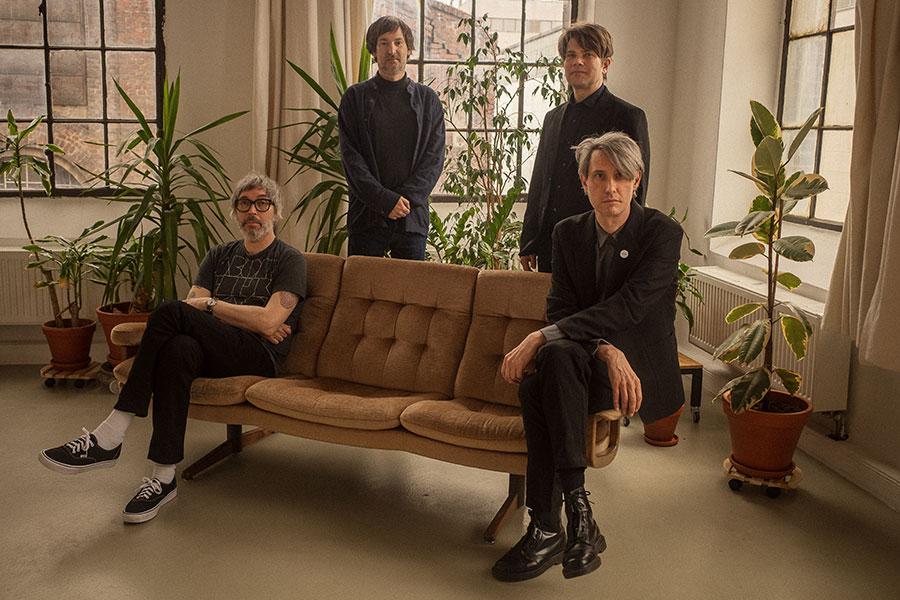Being loud is easy. It can hide a multitude of sins while attracting attention for all the wrong reasons. Being gentle or delicate can be difficult. But, as indie rockers Tocotronic prove, if done well, however, a band can really reap the rewards.
The Hamburg-based band has spent more than thirteen albums over three decades honing their craft. And while they certainly lean into their alternative and punk rock influences at times, their foundation seems to be firmly set in a subtly melodic and lo-fi indie sound. They experiment and they grow, but they remain fundamentally the same band.
If somehow you have, inexplicably, managed to miss out on this longtime band, now is the time to get to know them better. This month, get to know Tocotronic and learn German with music!
Get to Know Tocotronic
Tocotronic was founded in 1993 in Hamburg, Germany, by then-students Dirk von Lowtzow (vocals and guitar), Jan Müller (bass), and Arne Zank (drums). Zank and Müller had previously played in another band together while von Lowtzow was a Hamburg transplant originally from Freiburg.
The group took its name from Tricotronic, Nintendo’s predecessor to the Game Boy (known as Game & Watch outside of West Germany and Austria).
In 2004, the trio grew to a quartet with the addition of American-born Rich McPhail on keyboard and guitar.
Music of Tocotronic
After founding the band, the group wasted little time before getting to work. They quickly developed a following within the Hamburg music scene and signed with the local independent record label L’Age D’Or. In 1995, the group released two albums: Digital ist besser and Nach der verlorenen Zeit.
Both albums featured a mix of rough-around-the-edges ’90s guitar rock that has hints of melody peeking out beneath a wall of buzzing guitar fuzz. And the albums set the tone for the band with slogan-like song titles and lyrics, like “Es ist einfach Rockmusik” (“It’s simply rock music”) or “Ich möchte Teil einer Jugendbewegung sein” (“I would like to be part of a youth movement”).
But it is the band’s third album, 1996’s Wir kommen um uns zu beschweren (We come to complain) that got them their first taste of the German record charts (placing a respectable 47). The quick songs — most no more than a couple minutes in length — are approachable punk rock with little variation. There are a few exceptions, like “So jung kommen wir nicht mehr zusammen,” a relatively lengthy ballad jam with a wall of fuzz.
By the late 1990s, Tocotronic’s momentum was really building. 1997’s Es ist egal, aber maintained the tight track lengths. But the album sees the band really exploring and indulging in quieter moments, such as on the title track, a full melodic ballad. But just when you get comfortable, they jerk you into uncertainty. Halfway through the album’s closing track, “Nach Bahrenfeld im Bus,” the guitars squeal amidst the white noise of feedback.
The group’s fifth studio album is 1999’s K.O.O.K.. It sees the band experimenting with longer songs but maintaining their humble sound. There are never any big plays for attention, no gimmicks: it is simple, straightforward, and honest rock throughout. It is interesting to note that the band recorded an English-language version of the album only available in certain countries.
By 2002, the Hamburg band had found its stride. The band’s self-titled album hit #5 and #6 on the German and Austrian album charts, respectively. And the album sees a fuller, more produced-sounding group. While they never fully embraced a “pop” sound, the self-titled album has a somewhat dark and emotionless tone, such as on “Schatten werfen keine Schatten.”
2005’s Pure Vernunft darf niemals siegen is the band’s seventh and last album with L’Age D’Or, which went out of business a few years later. Tocotronic continues to confidently indulge and focus on its instrumentation. It is a move that pays off, producing strong results that pull listeners in.
Perhaps the group was sending a message with 2007’s notably named Kapitulation, its first on Vertigo Records (a subsidiary of major label Universal). Regardless of the intent, from the jangling and melodic start of the memorable title track, it is clear that even after all this time Tocotronic still has a fire in their collective bellies.
And with 2010’s Schall & Wahn the group had their first number one record in Germany. The album shows just how far you can go in the pop world without ever fully embracing pop. And almost as an added sneer, they include the bold and punky DIY anthem “Macht es nicht selbst.”
Since then, the group continues to record and release albums that reach near the top of the German album charts. 2013’s Wir wir leben wollen is, as always, nice and likable, but also perhaps their first truly catchy album. The accessible sound continues on their second self-titled album in 2015 which the band has described as a concept album focused on love.
At the time of writing, the band’s most recent album is 2022’s Nie wieder Krieg. It blends all of the beautiful jangling noise and smooth ballads you have come to expect from Tocotronic into a single album.
Looking for another Ohrwurm to help you learn German? Check out previously featured musicians and bands!
Photo by Gloria Endres de Oliveira courtesy of KKT Berlin. This post contains affiliate links.
